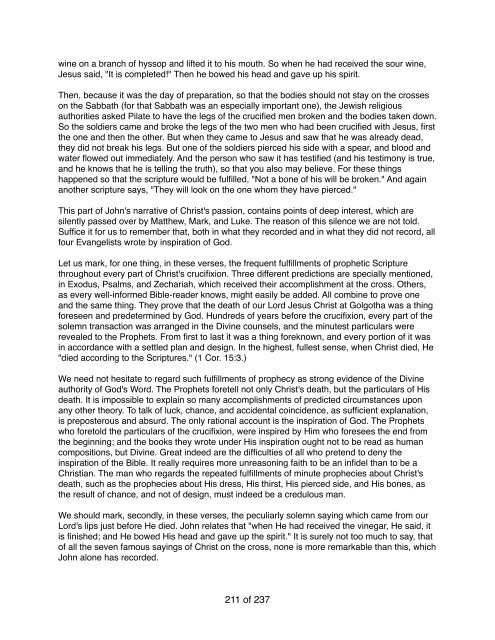J. C. Ryle John
John Charles Ryle (May 10, 1816 - June 10, 1900) was an evangelical Anglican clergyman and first Bishop of Liverpool. He was renowned for his powerful preaching and extensive tracts.
John Charles Ryle (May 10, 1816 - June 10, 1900) was an evangelical Anglican clergyman and first Bishop of Liverpool. He was renowned for his powerful preaching and extensive tracts.
You also want an ePaper? Increase the reach of your titles
YUMPU automatically turns print PDFs into web optimized ePapers that Google loves.
wine on a branch of hyssop and lifted it to his mouth. So when he had received the sour wine,<br />
Jesus said, "It is completed!" Then he bowed his head and gave up his spirit.<br />
Then, because it was the day of preparation, so that the bodies should not stay on the crosses<br />
on the Sabbath (for that Sabbath was an especially important one), the Jewish religious<br />
authorities asked Pilate to have the legs of the crucified men broken and the bodies taken down.<br />
So the soldiers came and broke the legs of the two men who had been crucified with Jesus, first<br />
the one and then the other. But when they came to Jesus and saw that he was already dead,<br />
they did not break his legs. But one of the soldiers pierced his side with a spear, and blood and<br />
water flowed out immediately. And the person who saw it has testified (and his testimony is true,<br />
and he knows that he is telling the truth), so that you also may believe. For these things<br />
happened so that the scripture would be fulfilled, "Not a bone of his will be broken." And again<br />
another scripture says, "They will look on the one whom they have pierced."<br />
This part of <strong>John</strong>'s narrative of Christ's passion, contains points of deep interest, which are<br />
silently passed over by Matthew, Mark, and Luke. The reason of this silence we are not told.<br />
Suffice it for us to remember that, both in what they recorded and in what they did not record, all<br />
four Evangelists wrote by inspiration of God.<br />
Let us mark, for one thing, in these verses, the frequent fulfillments of prophetic Scripture<br />
throughout every part of Christ's crucifixion. Three different predictions are specially mentioned,<br />
in Exodus, Psalms, and Zechariah, which received their accomplishment at the cross. Others,<br />
as every well-informed Bible-reader knows, might easily be added. All combine to prove one<br />
and the same thing. They prove that the death of our Lord Jesus Christ at Golgotha was a thing<br />
foreseen and predetermined by God. Hundreds of years before the crucifixion, every part of the<br />
solemn transaction was arranged in the Divine counsels, and the minutest particulars were<br />
revealed to the Prophets. From first to last it was a thing foreknown, and every portion of it was<br />
in accordance with a settled plan and design. In the highest, fullest sense, when Christ died, He<br />
"died according to the Scriptures." (1 Cor. 15:3.)<br />
We need not hesitate to regard such fulfillments of prophecy as strong evidence of the Divine<br />
authority of God's Word. The Prophets foretell not only Christ's death, but the particulars of His<br />
death. It is impossible to explain so many accomplishments of predicted circumstances upon<br />
any other theory. To talk of luck, chance, and accidental coincidence, as sufficient explanation,<br />
is preposterous and absurd. The only rational account is the inspiration of God. The Prophets<br />
who foretold the particulars of the crucifixion, were inspired by Him who foresees the end from<br />
the beginning; and the books they wrote under His inspiration ought not to be read as human<br />
compositions, but Divine. Great indeed are the difficulties of all who pretend to deny the<br />
inspiration of the Bible. It really requires more unreasoning faith to be an infidel than to be a<br />
Christian. The man who regards the repeated fulfillments of minute prophecies about Christ's<br />
death, such as the prophecies about His dress, His thirst, His pierced side, and His bones, as<br />
the result of chance, and not of design, must indeed be a credulous man.<br />
We should mark, secondly, in these verses, the peculiarly solemn saying which came from our<br />
Lord's lips just before He died. <strong>John</strong> relates that "when He had received the vinegar, He said, it<br />
is finished; and He bowed His head and gave up the spirit." It is surely not too much to say, that<br />
of all the seven famous sayings of Christ on the cross, none is more remarkable than this, which<br />
<strong>John</strong> alone has recorded.<br />
211 of 237




